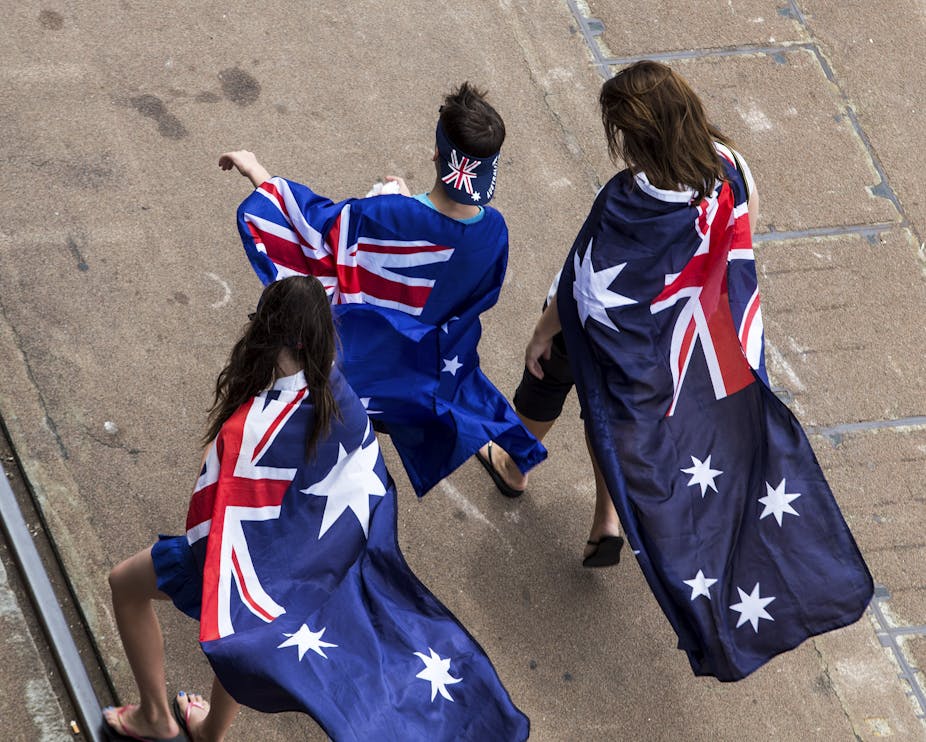The decision by Aldi and Big W last week to remove their government-approved Australia Day T-shirts from sale followed a social media-led backlash against the slogan on the shirts: “Australia Est. 1788”.
Australia Day has always been problematic as a national day of celebration. The “Est 1788” line only serves to emphasise this point. Apart from being offensive to indigenous Australians, it is, quite simply, historically incorrect.
The date we acknowledge as Australia Day is the anniversary of the establishment of the British colony of New South Wales. It’s a wonder, then, that Queenslanders want anything to do with it.
Although they colonised the land, the British did not discover Australia. That occurred with the arrival of the Aboriginal ancestors. We also know that Dutch and Portuguese navigators were aware of the southern landmass and mapped the western coastline as early as the 1600s.
By the 1700s the French were showing interest. The British settlement in 1788, as well as being a penal colony, was the culmination of a race to establish a strategic base for political and economic control of the South Pacific region.
Captain Arthur Phillip was hoisting the Union Jack at Port Jackson as his French counterpart, Captain Jean-François Lapérouse, was sailing into Botany Bay. By the time the French expedition arrived in Port Jackson, the land had been claimed for King George III.
Australia, as a nation, wasn’t established until 1901. The six separate British colonies of New South Wales, Victoria, Queensland, Tasmania, South Australia and Western Australia were federated by the grace of Queen Victoria via the Commonwealth of Australia Constitution Act 1900, enacted by the British parliament.
Australia, the country, is the oldest landmass on the planet and has been inhabited for at least 70,000 years. This is where the celebration of Australia Day has always been – and, I would argue, always will be – divisive. The indigenous community regard Australia Day as Invasion Day, and more recently, Survival Day.
Celebrating the First Fleet anniversary legitimises the now legally discredited notion of terra nullius. It marks the point at which the British government took possession of a land that was already occupied by a people who could have claimed sovereign rights, had they been consulted. The Aboriginal Tent Embassy was established on January 26, 1972, in protest against the denial of Aboriginal land rights.
On January 26, 1988, Australia threw a big party. The Bicentennial celebrations, which focused largely on Sydney Harbour, was an excuse for Australians to do, en masse, what Australians like to do in summer anyway: cook and eat charred meat in outdoor locations, play cricket using upturned beer cartons as stumps, swim and drink alcohol from tins. Except this time doing so while wearing green and gold outfits bedecked with the national flag.
On January 27 the nation awoke with a continental hangover and Australia Day had taken on a new, and not altogether positive, meaning. Until 1988, the holiday had been observed as a conveniently placed long weekend to mark the end of the summer school holiday, generally without the jingoistic fanfare. The Bicentenary changed all that.
Sometime around the mid-1990s the anniversary started to become infused with nationalism and its accompanying racist undertones. It is no accident that this coincided with the election of Pauline Hanson and her maiden speech in which she stated that Australia “is in danger of being swamped by Asians”. “Hansonism” and the establishment of One Nation, along with the Howard government’s extinguishing of native title, the “Fortress Australia” approach to refugee arrivals and Howard’s 2001 election speech in which he said, “We will decide who comes into this country and the circumstances in which they come”, opened the door to tacitly sanctioned racism. This has manifested in Australia Day becoming a nationalist focal point.

In 2009, Australia Day celebrations in Manly turned particularly ugly when a large group of young people, many drunk and/or draped in the flag, targeted non-Anglo people in a rampage that included damage to cars and property. Local authorities tried to deny that the riot was racially motivated, but the evidence suggested otherwise.
Undoubtedly some of the offending “Est 1788” t-shirts, sold before they were pulled from sale, will show up at Australia Day celebrations this year. The contemporary design of the slogan indicates a target market of young people. History has taught us that the youth of a nation are all too often used as the vehicle for dangerous nationalism: Hitler Youth, anyone? Mao’s youth movement of the Cultural Revolution? The skinheads of the British National Front?
It is time for Australia, as a mature nation, to acknowledge its past, atone for its mistakes, repudiate jingoistic nationalism and move towards a national celebration inclusive of all Australians.

